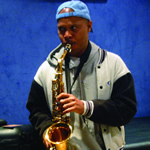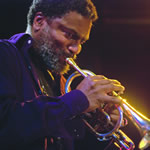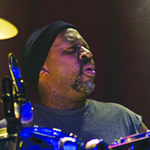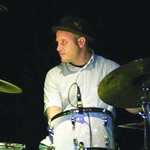Allegro
‘Carpe Diem, Baby!’
After Winter Jazzfest victory, now what?
Volume 111, No. 12December, 2011
Marc Ribot
 Jim Black
|
Pictured at right, the Winter Jazzfest Steering Committee. To join future organizing efforts in this community of musicians, send an e-mail to: indie_musicians_solidarity_network@lists.riseup.net
As a musician who has played the New York Winter Jazzfest, and as part of the steering committee that negotiated it, I celebrate the union contract announced in last month’s Allegro articles by John O’Connor, Shane Gasteyer and Andrew Schwartz.
I’d like to thank all three of them: John for his skill and professionalism in the collective bargaining process, Shane for his hard work and knowledge of the scene – something essential for someone trying to organize musicians – and Andy for recognizing the necessity of growing the union through new organizing and the important place jazz and avant-jazz players – all part of a larger community of “indie” musicians – have in this effort.
I’d also like to thank the members of the steering committee. To anyone at all familiar with the contemporary jazz scene, their names alone – appearing in a union context – are the real news: Jim Black, Steve Coleman, Orrin Evans, Mary Halvorson, Graham Haynes, JT Lewis, Jason Moran, Butch Morris, Ben Perowsky and Jen Shyu.
That musicians this much in demand – including critics’ poll winners, MacArthur grant fellows and Downbeat cover artists, known to musicians and fans all over the world – not only signed on but became actively involved in what turned out to be a very time-consuming effort, is nothing short of amazing.
However, while celebrating, we also need honest discussion of limits as well as accomplishments.
Although the benefits won were substantial (pay will more than double for most musicians during the next two years), the fact is that they took nearly a year of organizing to achieve and affect only the few days a year of a festival, at best a small fraction of the yearly income of the musicians involved.
While we hope to have a significant number of those who benefited join the union, many probably will not: the average increase won in wages is still less than regular yearly union dues.
I’m not complaining, and neither is anyone else on the committee: we needed to prove to ourselves, the many skeptical musicians in our community, and those factions within the union still not convinced of the possibility of organizing beyond Local 802’s traditional areas of support, that we have both a need and ability to organize.
Mostly, we needed to do something to let employers know that we’re not just going to sit back and accept a lowering of our standards of pay.
We did all the above and we’re proud of it. But we also see the Winter Jazzfest as a beginning, a symbol of what could be, and we know that in terms of really making a dent, it’s only the tip of the iceberg.
So, what next?
Before we can answer that, we need to address the question of just who “we” are.
Winter Jazzfest musicians are, most obviously, jazz musicians. Like most jazz gigs in the last 50 or more years, this festival had been nonunion.
But the reasons jazz gigs are so often nonunion have nothing to do with the musical genre we play. When musicians perform jazz in the context of a Broadway show, play a swing tune at a unionized hotel restaurant or society function, or record for a major label, we are covered by union contracts.
The reason most jazz gigs are not union is a structural one. We work in an “indie” part of the industry that has resisted unionization: indie record labels and the related network of clubs, festivals and touring circuits.
Jazz musicians are one aesthetic community among many who are part of this “indie” group. And indie musicians are, themselves, a part of a much larger group of workers in industries across the board who have undergone what political economists call a “Post Fordist” restructuring. (See the study by Mike Roberts and Stanley Aronowitz called “The Irony of the Indies.”)
What all three groups – contemporary jazz musicians, indie musicians and workers in “Post Fordist” sectors of industry – have in common are certain features distinguishing our employment from what are traditionally thought of as union jobs. Among them are:
-
Freelance employment instead of permanent employment.
-
Instead of working for a single, large employer who profits directly, we work for outsourced, often smaller employers who are often themselves exploited through contracts with larger businesses.
These features have become increasingly common in the world of work precisely because they make union organizing difficult.
Ultimately, if the union is to win substantial victories for indie musicians, it will have to deal with the question of indirect profits and outsourcing, and find ways of overcoming the structural and legal obstacles that business structured around outsourcing and indirect profits pose to organizing.
The Winter Jazzfest can itself be seen as an outsourced function of the annual NYC convention of the Association of Performing Arts Presenters.
The festival channels what would otherwise be a bewildering flood of performers seeking to attract the attention of APAP members into a manageable flow of critically respectable artists. The Winter Jazzfest is featured in APAP’s advertising and is a strong part of the value of attendance at its convention: APAP members are admitted free to all Winter Jazzfest concerts.
Therefore, APAP – which is technically a nonprofit – benefits indirectly from the Winter Jazzfest. But none of APAP’s $900 ticket price goes towards funding the musicians who perform at the festival
The clubs in which the Winter Jazzfest takes place also profit indirectly: they receive rental fees and make substantial profits from liquor sales to packed festival audiences, none of which goes back to the musicians.
What kind of benefits would have been winnable if our negotiations had included these potential sources of funding?
Recording ‘protection’ vs. real power
Outsourcing and indirect profits are also common features of indie recording. As John O’Connor wrote in last month’s Allegro, the new Winter Jazzfest union contract “contains recording language that protects musicians against the unauthorized use of captured material (audio recordings, video, web streaming, etc.)…Now musicians will enjoy recording protection…”
This is an important beginning. But we need to do better than that. Any musician can “protect” themselves against exploitation by staying home and never working. Problem solved. But most of us aren’t interested in the question of exploitation as an abstraction: we’re interested in how we can make enough bread to pay our bills. If being exploited earns you more than not being exploited, musicians will not view a union contract which forbids it as a victory.
A union recording contract which forbids a bandleader from signing with a nonunion indie record label or indie film company isn’t going to earn any artist or side musician one penny unless the union can also help leverage those businesses into paying up.
(The alternative – signing the contract themselves as employer – is not a realistic option for many indie artists, as it may involve making a commitment to paying re-use and other fees for which the artists themselves will receive no compensation.)
In the long run, the way to substantially impact the lives of indie musicians is for the union to move beyond “protection from” and into “power and leverage against” those who profit directly or indirectly from our labor.
Doing so effectively means we will have to confront the issues of outsourcing and indirect profits. This means looking beyond the immediate business in question – the indie label or film company or Web site – and understanding who is deriving profits from them (is a distributor taking most of the profit?) or how is indirect profit being derived (is the owner of a Web site offering “free” music making millions off advertising?)
These are the kinds of questions union organizers in the U.S. have been trained not to ask during the past 60 or more years. Union action aimed at businesses that profit indirectly from our labor – for example, the parent corporation of an outsourced business – is often illegal, a violation of the secondary boycott provision of the Taft Hartley law.
The American labor movement has been told, in no uncertain terms, to “pay no attention to the man behind the curtain.” But we are going to have to pay attention if musicians are ever going to win a fair share of the wealth our labor creates in today’s economy. And the union is going to have to find new strategies, even if this means thinking outside the box.
I’m not suggesting here that we break the law – although civil disobedience remains an option. I am suggesting, wherever possible, that we find legal strategies around the impasses preventing the union from adequately representing indie musicians.
In the short run, we may need many more energy-intensive organizing efforts like the Winter Jazzfest before these long term solutions can be found. But it’s important to keep our eyes on the prize, and to continue to study this and other indie organizing efforts.
Fortunately, the successes at the Winter Jazzfest and other efforts in the indie area have already begun to suggest some strategies that might be useful.
We were able to win at the Winter Jazzfest without recourse to the usual NLRB-supervised process. The employers felt so vulnerable to public pressure that they agreed to negotiate after the petition we had posted to an obscure Web site was reported in the press.
We won a union contract through the simplest of community organizing tools. The fact that we didn’t need the NLRB’s rights in order to win meant that in some respects we were also not bound by its restrictions.
Global challenge
Another attribute of jazz/indie/Post Fordist workers and industries is globablization. Usually, globalization is seen as a drawback. But many of us on the steering committee could afford to risk a confrontation with a U.S. festival promoter because our best-paying work is in Europe.
Indeed, committee members were on the road so much it was hard to find even half of us in town at the same time. Face- to-face meetings were rare. We rocked Skype and listserves pretty hard.
For most of us, “the road” meant Europe or Japan. Although the European jazz touring situation remains far better funded than its U.S. equivalent, with correspondingly higher rates of pay, the situation in Europe is far from stable: there have been major cuts in the arts budgets of many European countries. (One Dutch promoter told me he’s expecting cuts in the neighborhood of 70 percent when the conservative Geert Wilders government takes power next year.)
This instability may have something to do with the fact that more U.S. jazz musicians are taking seriously the problem of dealing with injustice here at home. But we should also see it as a reminder that a union that wishes to represent musicians whose territory is the world needs to live up to its name as an “international union” by developing ties with unions and musicians in the countries where we actually work.
The art of listening
“The union must always be willing to listen carefully, and then act with the full support of the musicians involved before going forward into uncharted areas,” wrote Andy Schwartz in his Allegro article last month.
I agree. Part of “listening carefully” might include a dialogue with the Winter Jazzfest Steering Committee, avant jazz committee activists, and other musicians from the Winter Jazzfest and the Undead Jazz Festival to solicit their ideas on what direction new organizing in our community should take.
I also hope that Andy’s commitment to acting with the support of the musicians involved is given more than lip service, and is made union policy in the union’s upcoming organizing campaign at jazz clubs.
I know that in indie situations, democratic process can be difficult: how do you even know who the “employees” are in a situation of constantly changing freelancers?
However on the Winter Jazzfest Steering Committee, we operated with the belief these difficulties meant that we needed more, not less, commitment to democratic process.
We did so because we believe that musicians will only respect a union that respects them.
And respect means first and foremost respecting the rights of the musicians who actually work the gig to democratically determine:
-
What gigs need to be organized
-
What the demands should be
-
What level of collective action is acceptable
This isn’t something we did as a “favor.” If the Winter Jazzfest campaign had been launched top down, musicians would have seen the union as an unwelcome policeman and avoided it like the plague.
Now, thanks to the success of the Winter Jazzfest negotiations, there is a strong feeling of momentum in the community. A friend close to another NYC jazz promoter told me that he and his colleagues are running into increasing demands from musicians. He told me, “For better or worse, the Winter Jazzfest union campaign has re-ignited the idea that musicians deserve to get paid.”
Elsewhere, at the downtown jazz venue University of the Streets, musicians conducted an ongoing spontaneous strike that shut down the venue for almost two months after one musician was assaulted by management in a dispute over their pay-to-play policies. This action was organized entirely outside the union by musicians with no organizing experience whatsoever.
For a community practically written off not too long ago by the union as beyond the limits of solidarity, there seems to be a whole lot of solidarity going on.
This momentum needs to be organized and channeled to be effective.
But one thing should be clear: the musicians who organized at the Winter Jazzfest – and other indie musicians who have not yet organized – are a real community of solidarity.
The structure of our work is different in some ways from that of the communities which have historically formed Local 802’s core constituencies. So are the work rules and demands we will make if given the chance. (We will also need new organizing strategies to give us that chance.)
If Local 802 and the AFM can make room for these differences, then the union can grow to once again represent a majority of working musicians.
If not, no amount of preaching of the benefits of union membership will do the trick.
We’re at a watershed moment. The choices we make about whether to build on the momentum of Winter Jazzfest or not – and if so, how – will determine whether new organizing succeeds in Local 802 for years to come.
Carpe diem, baby!









